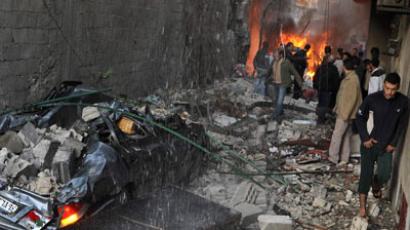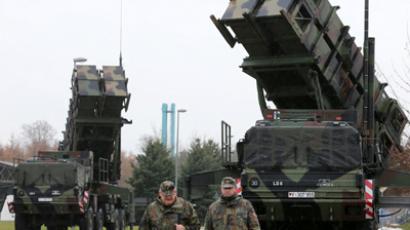'No confirmed reports' Syrian govt preparing to use chemical weapons – UN chief

UN chief Ban Ki-moon has said there are no confirmed reports that Damascus is preparing to use chemical weapons in the ongoing Syrian conflict. The statement comes amid speculation that loyalist forces are loading deadly nerve gas into aerial bombs.
"Recently we have been receiving alarming news that the Syrian government may be preparing to use chemical weapons. We have no confirmed reports on this matter," Secretary-General Ban said while visiting Syrian refugee camps in Turkey on Friday, as Haaretz daily quotes him. Ban stressed it would nevertheless be an “outrageous crime” with wide-reaching consequences if the Syrian government used chemical weapons against civilians. This week, NBC reported that the Syrian military has loaded the deadly nerve gas Sarin into aerial bombs, which could then be dropped on rebels from Mig-23 or Sukhoi-24 aircraft.ABC News also quoted unnamed American officials as saying that so far, the bombs have not been loaded onto planes. Over the last 48 hours, no major movement has been reported at Syria’s chemical weapons sites. The news prompted comments from Washington, with US Secretary of State Hilary Clinton reiterating that the use of chemical weapons would be crossing “a red line.”Syria’s chemical weapons stockpile became a topic of international concern this past July. Syria is reportedly in possession of nerve agents, including mustard gas, as well as the Scud missiles needed to deliver them. The country is one of six states that have not signed the Chemical Weapons Convention, which outlaws their production. Since July, President Bashar Assad’s government has repeatedly stated that chemical weapons will not be used on Syria, but he also has not excluded the possibility they might be deployed in the event of “a foreign attack.”Both Moscow and Washington condemned the possible use of chemical weapons. The proliferation or use of chemical weapons is “unacceptable" to Russia, Foreign Minister Sergey Lavrov has said on numerous occasions. Moscow has been pressing Damascus for regular guarantees its chemical weapons stockpiles have not been moved, are properly guarded and will not be used in any conflict.US President Barack Obama has also warned Assad that if he makes “the tragic mistake of using these weapons, there will be consequences” and he “will be held accountable.”Washington is worried that Syria’s chemical weapons might fall into the hands of the Syrian rebels, some of whom have links to Al-Qaeda, Secretary of State Clinton said.“Our concerns are that an increasingly desperate Assad regime might turn to chemical weapons or might lose control of them to one of the many groups that are operating within Syria,” Clinton told reporters on Wednesday.But critics say, Washington's continuous claims of Syrian preparations of chemical weapons are based on strategy, not real concerns. The situation in Syria is akin to the war in Iraq, Ibrahim Alloush of the Zaytouneh University in Jordan told RT.“The purpose of drumming up these allegations about Syrians attempting or pondering the usage of chemical weapons is either to justify a military intervention directly in Syria, or to justify arming the rebels with qualitatively better weaponry, especially anti-aircraft missiles. Or, if things came to a political settlement, to impose the presence of international monitors, which should be in the best interests of Israel,” Alloush said.The recognition of the Syrian opposition as the sole legitimate voice of the Syrian people is another “blatant” attempt on behalf of Western powers to further destabilize the Syrian government, Alloush told RT. The consequences of the Assad government’s dissolution could be dire, he added.“The US and the NATO are trying to circumvent the legitimate process that has to take place through international law. They’re trying to bring about the change within Syria like they did in Iraq, or Libya, by undermining the legitimate government and bringing about chaos, fragmentation, bloodshed, civil war instead. It would be another Iraq – but on a larger regional scale,” he warned.














